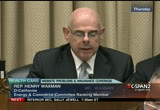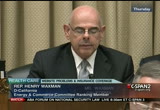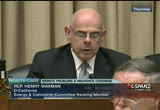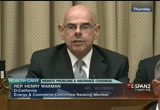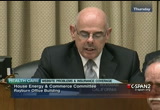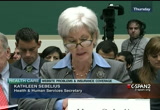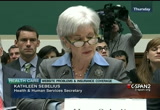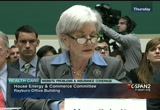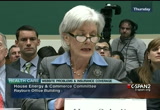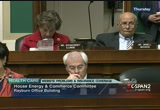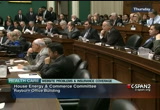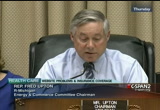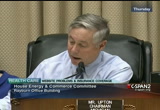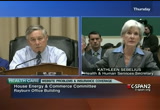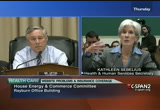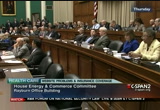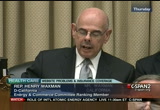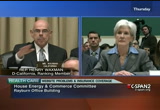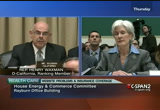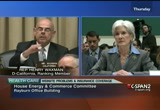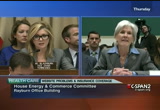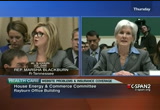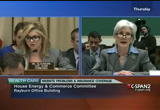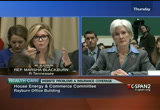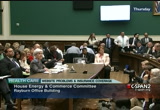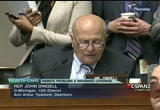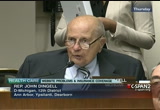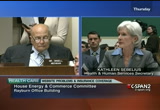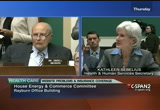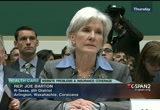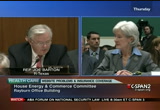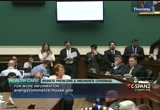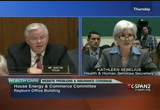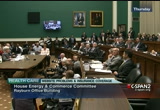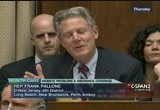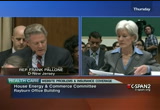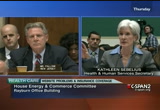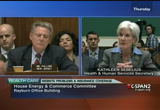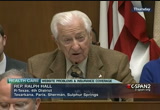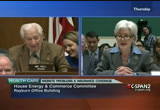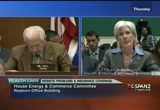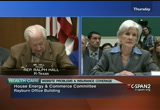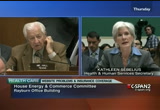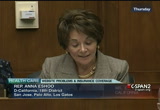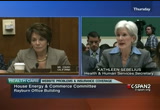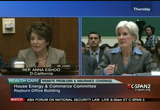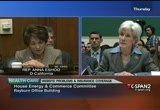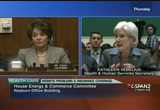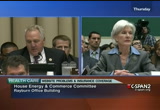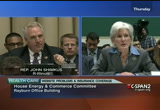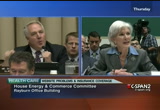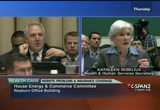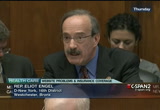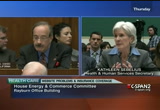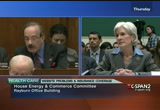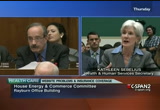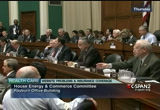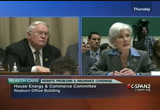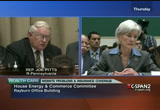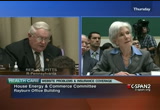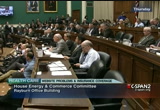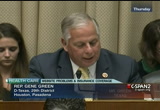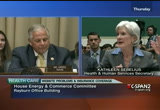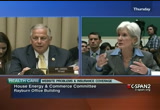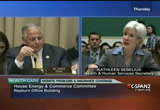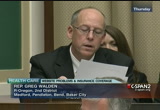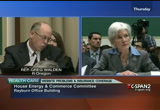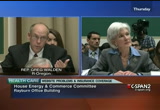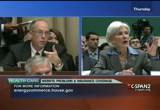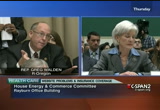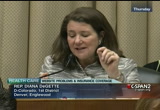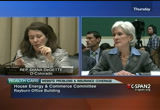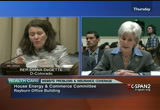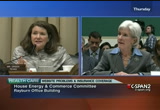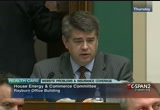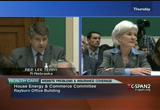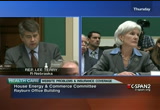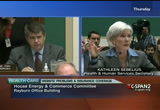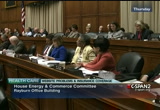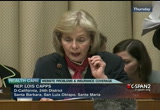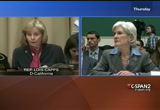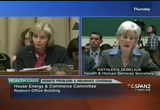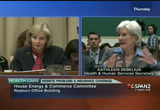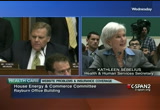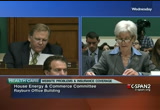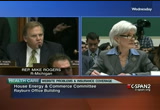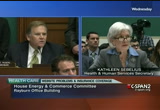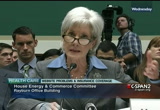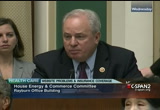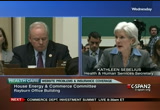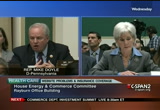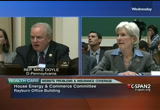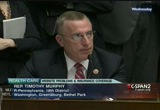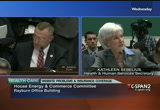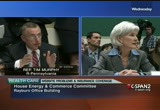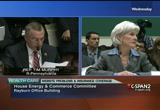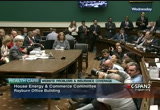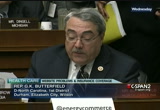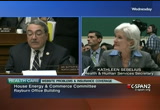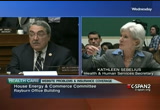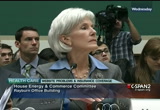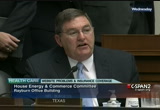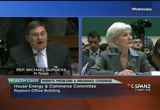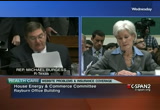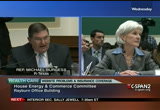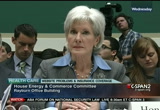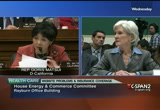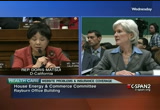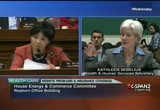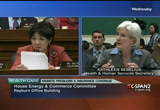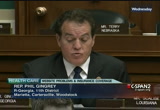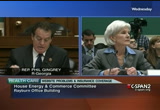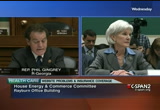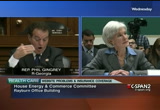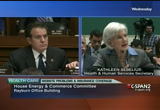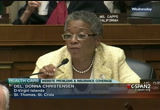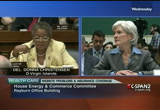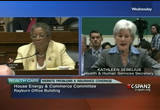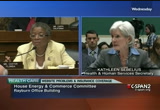tv Key Capitol Hill Hearings CSPAN November 1, 2013 4:00am-6:01am EDT
4:00 am
working. it has been improving the health security of millions of americans for the past three years. because of the affordable care act, more than 7 million people on medicare have saved more than $8 billion on their prescription drugs. more than 100 million americans have access to free preventive coverage. and no longer face lifetime limits on their coverage. over 10 million americans have received rebates from insurance companies and finally, this january, the worst abuses of insurance industry will be halted. never again will a family be denied coverage because their child has a chronic health condition. never again will individuals see their premiums shoot up because they got sick or faced an
4:01 am
unexpected medical expense. never again will a woman have to pay twice as much as a man for the same insurance. that is why allowing insurers to continue offering deficient plans next year is such a bad policy. the law says that all plans except those that were grandfathered in 2010, must meet the new consumer protection standards. if we don't enforce this policy, insurance companies can continue offering flimsy coverage that disappears when people actually need it and no one should want that. it is understandable that there will be a focus today on what isn't working, but we must also remember what is working. the health insurance plans that are being offered in the exchanges are good plans. the premiums are much lower than
4:02 am
expected. 60% of the uninsured individuals shopping in the new marketplaces will be able to get coverage for less than $100 per month. half of the young adults will be able to get coverage for less than $50 per month. and since congress adopted the affordable care act, health care costs across the whole economy have grown at their lowest level in decades. the success of the affordable care act is due to the efforts of many people, but one individual more than any other is responsible for all of the good that has been accomplished and that is our witness today, secretary sebelius. so i would urge my colleagues to stop hyperventilating. the problems with healthcare.gov are unfortunate and we should investigate them and then every american will have access to affordable health insurance. thank you, mr. chairman.
4:03 am
>> before we swear in secretary sebelius, i want to clarify energy and commerce committee practice for swearing in of witnesses. the committee typically has two types of hearings. oversight hearings and hearings that focus on legislation and policy. secretary sebelius, for example, has testified previously before our committee to discuss issues relating to hhs budget or other policy matters. as is the case with all policy witnesses, secretary sebelius was not required to take an oath prior to testifying. today's hearing is different. it's an oversight hearing. it is a long standing committee practice to swear in all witnesses at oversight hearings whether they are private citizens or cabinet secretaries. >> mr. chairman, i thank you for your comments. i just want to join you in simply explaining that swearing in of the witness before an oversight committee hearing has always been under oath.
4:04 am
that is a standard procedure in this committee when we're conducting an oversight hearing so it may seem strange to have the secretary of health and human services have to be sworn in, but all witnesses in an oversight hearing are sworn in and that is our procedure. >> thank you. so i would now like to introduce our witness for today's hearing. the honorable kathleen sebelius is the secretary of the department of health and human services. she was appointed to this position in april of 2009. and was sworn in as the 21st secretary on april 28th, 2009. so i will now swear you in if you would rise. as ranking waxman and i just discussed, the committee is holding an investigative hearing and when doing so have had the practice of taking testimony under oath. do you have any objection to testifying under oath? and the chair now advises you that you are -- i would now read
4:05 am
you -- do you swear that the testimony you are about to give is the truth, the whole truth and nothing but the truth? you are now under oath and subject to penalties set forth in title 18 section 1001 of the u.s. code. you may now give a five-minute summary of your written statement. welcome again and thank you for being here. you have to use that mike. you don't know how many people want to hear you this morning. >> thank you, chairman, upton, ranking member waxman, members of the committee. i left my position as governor of kansas 4 1/2 years ago for the opportunity to continue work i've been doing for most of my over 35 years of public service, to expand the opportunities for all americans regardless of geography or gender or income to have affordable health coverage. during my years as the state legislator, as an elected
4:06 am
insurance commissioner, as head of the national association of insurance commissioners and as a two-term governor and now as hhs secretary, i have worked on that effort that i care deeply about. there are still millions of americans who are uninsured as well as underinsured. people who have some coverage at some price for some illness but have no real protection from financial ruin and no real confidence they'll be able to take care of themselves and their families if they have an accident or an illness and for them a new day has finally come. in these early weeks, access to healthcare.gov has been a frustrating experience for many americans including many who have waited years for security of health insurance. i am as frustrated and angry as anyone with the flawed launch of healthcare.gov. let me say directly to these
4:07 am
americans, you deserve better. i apologize. i'm accountable to you for fixing these problems. i'm committed to earning your confidence back by fixing the site. we're working day and night and will continue until it's fixed. we recently added new management talent, additional technical expertise to manage fixes across the system in two broad categories, speed and function. our extensive assessment has determined that healthcare.gov is fixable. we now have more users successfully creating accounts. we can process up to 17,000 account registrations per hour or nearly five per second. instead of some of the users seeing a blank screen at the end of the application process, they
4:08 am
can now see whether they're eligible for financial assistance and make more informed decisions. because we've improved performance, customers can shop for plans. it takes seconds and not minutes. users are getting fewer errors and time-out messages as they move through the application process and the system has been strengthened with double the size of servers, software that's better optimized and a high capacity physical data base replacing a virtual system. the chairman referred to outages this weekend and again yesterday. i would suggest to the committee that if you read the statement of verizon who hosts the cloud service, it is the verizon server that failed and not healthcare.gov and affected not just hhs but other customers. we still have a lot of work to do. with very a plan in place to address key outstanding issues. it includes fixing bugs in software that prevented it from working the way it's supposed to and refreshing the user
4:09 am
experience so folks can navigate the site without encountering slower response times and by the end of we're committed that the vast majority of users will be able to shop for health care without problems being experienced. problems are being solved. we know that we don't have a fully functioning system that consumers need and deserve. we are still at the beginning of a six-month open enrollment which extends through the end of march and there's plenty of time to sign up. just to put it in perspective. average open enrollment for the average insurance plan is two to four weeks. the new marketplace at 26-week open enrollment and those that enroll by december 15th will access their benefits on day one. even with the unacceptable problems with healthcare.gov which we are committed to fixing
4:10 am
the affordable care act is working for millions of americans who are benefiting from new health security, young adults, americans living with pre-existing health conditions, seniors on medicare. 85% of americans who already have health coverage are protected with new rights and benefits. the 15% of our neighbors and friends who are uninsured have affordable new options in a competitive market. and cost growth for health care is lower than it's been in years. millions of americans are clearly eager to learn about their options and to finally achieve health security made possible by the affordable care act. my commitment is to deliver on that promise. thank you, mr. chairman. >> well, thank you very much. the mike got pulled a little bit from you. can you fix that? i appreciate you being here this
4:11 am
morning and we've worked with our leadership to see that we don't have votes on the house floor this morning so we won't be interrupted. i appreciate your time for sure and in an effort to allow every member to ask a question, we're going to be reducing the time for questions to be just four minutes so hopefully we can get through all of the members that are here. i'm going to be pretty fast with the gavel let me just say. we have plenty of questions. so let's try to get through them. you know, i think everyone in america remembers the president's words. if you like your health care plan, you can keep it. period. under the affordable care act insurance policies that were in effect on march 23rd, 2010, when the law was enacted, would be grandfathered. then a few months later despite the president's word, hhs helped
4:12 am
promulgate a new reg that in your own review showed that it could affectively deny as much as 50% or maybe even higher of those holding individual policies the right to renew their own insurance plan. i would guess there are a lot of us on this panel today hearing from angry and confused constituents who are now being forced to go onto an inept website, whether they like it or not, to shop for a new replacement policy. they find premiums often more than 100% what they were paying before. some even as high as 400% as i've heard from and rising deductibles as well. so when was the president specifically informed of the regulation change and if so, was it pointed out that this totally undermines his biggest selling point and i would note that on the screen in a statement that he made more than three years
4:13 am
after the regulation change was promulgated, the president said again so the first thing you need to know is this. if you already have health care, you don't have to do anything. so he's been on the same page from the very start yet the regulations changed months after the bill was enacted that are now causing perhaps millions of americans to be denied the ability to renew their individual coverage. why was that change made? and did the president know it? >> mr. chairman, there was no change. the regulation involving grandfathered plans which applied to both the employer market and the individual market indicated that if a plan was in effect in march of 2010, stayed in effect without unduly burdening the consumer with reducing benefits and adding on huge costs, that plan would stay in effect and never have to
4:14 am
comply with any regulations of the affordable care act. that's what the grandfather clause said. the individual market which affects about 12 million americans, about 5% of the market, people move in and out, they often have coverage for less than a year. a third of them have coverage for about six months. and if a plan was in place in march of 2010 and again did not impose additional burdens on the consumer, they still have it. it's grandfathered in. >> why not let the consumer decide whether to renew it or not? why were regulations promulgated in the summer of 2010 that undermine the ability for those folks to resign up which is a reason for large cancellation notices. >> we began to implement the other features of the affordable care act. if someone is buying a brand new policy in the individual market today or last week, they will have consumer protections for the first time. many people in the individual market are medically
4:15 am
underwritten. that will be illegal. many women are charged 50% more than men. that will be illegal. you cannot again eliminate someone because of a pre-existing health condition. you can't dump someone else or lock someone out. those provisions -- if again, a plan is in place and was in place at the time that the president signed the bill and the consumer wants to keep the plan, those individuals are grandfathered in and that's happening across the country in the individual market. >> we're learning in fact that folks who did have a plan who liked it in fact are being told that it's canceled in the last -- my time expired. let me yield to the ranking member, mr. waxman for four minutes. >> thank you, mr. chairman. i had to smile at your line of questioning because everyone expected this hearing was about the website. that's all we've been hearing about is the website. but that's not the only complaint we've been hearing about since the affordable care act was adopted. we were told by our republican friends that millions of jobs
4:16 am
would be lost and in fact there have been a gain of 7 million jobs. they said that the cost for health care would skyrocket and in fact the opposite is true. they said there would be a massive shift to part-time jobs and evidence doesn't support that. tens of millions will lose their insurance. in fact, everybody in this country is going to have access to health insurance because they won't be discriminated against. they said that it would explode the deficit and yet all of the reputable organizations like the congressional budget office have told us it will save us $100 billion over ten years. so we've had a litany of objections from the republicans about the affordable care act, which has driven them to such a frenzy, they even closed the government. now we have you before the committee. and you're being asked, i suppose, later about the website. let me pursue this question
4:17 am
about individuals who have gotten notices that they're going to have their individual insurance policies canceled. they'll be able to get another plan, won't they? >> actually, it's the law that they must get another plan. continuous coverage is part of the law. and that wasn't the case in the past. >> so the affordable care act said we're going to end the worst abuses of insurance companies. we're going to create consumer protections in the marketplace that they will be able to buy a policy even if they had been sick in the past that women won't be charged more than men, that we're not going to let insurance companies deny coverage because of pre-existing conditions. we're not going to let them put these lifetime caps and they'll be an essential benefit package so you don't just buy some things and not having other things covered. you'll have the minimum that everybody should have. prescription drugs, mental health coverage, doctors in hospitals. are these important consumer
4:18 am
protections? >> i would say, mr. waxman, they are very important. as a former insurance commissioner, i can tell you that the individual market in kansas and anywhere in the country has never had consumer protections. people are on their own. they could be locked out. priced out. dumped out. that happened each and every day so this will finally provide the kind of protections that we all enjoy in our health care plans as part of a group, as part of a plan that has prenegotiated benefits. we enjoy that kind of health security and individuals in the buying insurance on their own, farm families, entrepreneurs, mom and pop shops, young adults, have never had that kind of health security. >> now they're going to have this health security and most of the plans as i understand it they are no longer going to be able to keep don't meet all of the standards of the law. >> again, i think you may have heard pat garrity from florida
4:19 am
blues on some of the sunday shows and he talks about the fact that the florida plans want to keep their customers. they have new plans to offer. they feel that a lot of people and these are mr. garrity's words will have a much better plan at similar or lower cost. 50% of these 11 to 12 million people qualify for financial help purchasing insurance for the first time ever. >> the bottom line is people with good coverage like medicare, medicaid, employer coverage, can keep that. people with grandfathered plans through the individual market will be able to keep it. if an insurance company sold you a new modified health insurance policy after the date of the enactment that does not meet the law's standards, then those people will be able to go into the exchange and buy a real solid health insurance plan that won't discriminate against them
4:20 am
or anybody else. i think that's a good result. i'm pleased with it. i think most people will be as well. >> gentleman's time has expired. chair recognizes the vice chair of the committee, ms. blackburn. >> madame secretary, before, during and after the law was passed the president kept saying if you like your health care plan, you can keep it so is he keeping his promise? >> yes, he is. >> okay. what do you say to 300,000 people in florida you just mentioned or to the 28,000 in tennessee that cannot get health insurance? their plans are terminated. is he keeping his promise to them? >> first of all, congresswoman, they can get health insurance. they must be offered new plans, new options, either inside the mark marketplace or if they don't qualify for a financial subsidy they can shop inside or outside of the marketplace. >> what do you say to nbc news
4:21 am
that say they will lose their coverage? >> i think it's important to be accurate about what is going on and i would defer again to the president of the -- they will have continuing coverage and offered new plans. >> madame secretary, what do you say to mark and loucinda in my district who had plan and it was affordable and now it's terminated and they don't have coverage. >> they are a one-year contract with individuals. they are not lifetime plans. they are not an employer plan. >> let me move on. i will remind you some people like to drive a ford and not a ferrari and some drink out of a red solo cup and not a crystal stem. let's put the screen shot up. i want to talk about the website. this is what's happening right
4:22 am
now with this website. we had somebody in the back trying to sign on. it is down. it is not working. last week i asked for the cost from each of the contractors that were with us last week. so can you give me a ballpark of what you have spent on this website that does not work that individuals cannot get to? what is your cost estimate? >> so far, congresswoman, we have spent about $118 million on the website self and about $56 million has been expended on other i.t. to support the web. >> would you submit a detailed accounting of exactly what has been spent and when do you expect constituents to stop getting these kind of error messages? >> again, i was with -- i talked to the president of verizon over the weekend on two occasions.
4:23 am
verizon hosts the cloud which is not part of the website. it is a host for a number of websites. the verizon system was taken down saturday night into sunday. it was down almost all day sunday. they had an additional problem they notified us about yesterday and it continues on. so i would be happy to talk to the president of verizon and get you information. >> let me come back to that. i want to come back to the issue of who is in charge of this project because you're now blaming it on the contractors and saying it's verizon's fault so let me ask you this. did you ever look at outsourcing the role of the system integrator and obviously you did not from the contractors that we had last week. they had several different people whether it was you or gary cohen or michelle snyder or henry chow they thought were in
4:24 am
charge. who is responsible for overseeing this project? is it you or your designee? >> i'm not pointing fingers at verizon. i'm explaining how the site operates. we own the site. the site has had serious problems. >> who is in charge, madame secretary? >> the person now in charge as an integrator is -- >> who was in charge as it was being built? of the team, who is the individual -- >> michelle snyder. >> michelle snyder is the one responsible for this debacle? >> excuse me, congresswoman. michelle snyder is not responsible for the debacle. hold me accountable for the debacle. i'm responsible. >> thank you. i yield back. >> chair recognize mr. dingell from the great state of michigan. >> thank you for your courtesy. i have a few questions i'll ask you on behalf of congressman
4:25 am
porter. i asked that i be permitted to extend my remarks. >> without objection. >> i would like to begin by thanking you and welcome you to a room in which your father served for so many years. i begin my questions by quoting from an expert for whom i have enormous respect. he said as follows. "as i mentioned earlier the new benefits and implementation are hard to perfect. rather than trying to scare and confuse seniors, i would hope we can work together as we go through the implementation phase to find out what is wrong with the program and if we can make some changes to fix it. let us do it and let us do it in a bipartisan fashion. it is too big a program and too important to too many people to do that. having said that it does appear that it is working. let us not keep beating a dead horse."
4:26 am
my beloved friend who gave us the beginning of our efforts today. madame secretary, i see reports that consumers receiving plan cancellation notices from their insurance companies saying that plans are no longer available. does the aca require insurance companies to discontinue the plans that people had when the law was passed, yes or no? >> not when the law was passed. no, sir. that's the grandfather clause. >> that's because the plans existed prior to passage of the law are grandfathered in as you have said? >> that's correct. >> so if an insurance company is no longer offering a certain plan, that's because that insurance company made a decision to change their policies and that caused them to take away the grandfather status from their insurance purchasers, is that right? >> that's correct. >> now, madame secretary. i want you to submit for the record a statement of what it is
4:27 am
we can do about insurance companies that run around canceling the policies of their people and i don't have time to get the answer but i want to get a very clear statement from you as to what you can do so we can take some skin off some folks that have it coming. madame secretary, it's my understanding that these decisions of a business character are most common in the individual insurance market and that much turnover already exists and existed prior to the enactment of the legislation. >> that's correct. >> is that correct? >> yes, sir. >> is it correct that 35% to 60% of the enrollees in individual market leave their plan after one year for different reasons? >> a third are in less than six months in the individual market and over 50% are in for less than a year, yes, sir. >> now, in the cancellation letters which move around from
4:28 am
the insurance companies, some insurance companies are suggesting an alternative plan at a higher price. do they have a right to do that? >> they have a right to do that, sir, but consumers have a right to shop anywhere to compare plans and they have choices now that they've never had before and some financial assistance coming their way for 50% of those people. >> no right to enforce that demand on the insurance company? >> no one is rolled over into a plan. individuals for the first time ever will have the ability to compare plans, to shop, and to make a choice inside or outside the marketplace. >> looks to me like the insurance companies are trying to inflict on their customers the view that this is their right and that this is the only option available to them, is that correct? >> i think that insurance companies would like to keep their customers. having said that, customers for the first time have a lot of choices. >> the insurance companies have no right to enforce that view on
4:29 am
customers? >> there's no rule that says you have to stay with your company or be rolled over -- >> gentleman's time has expired. gentleman's time has expired. chair recognizes the gentleman from texas, mr. barton. >> before i ask my questions, we have a former member of the committee on the democrat side from the great state of kansas in the audience. we are glad to have you. madame secretary, we're glad to have you too. >> thank you, sir. >> there's a famous movie called "the wizard of oz" and in "the wizard of oz" there's a great line. dorothy at some point in the movie turns to her dog toto and says "we're not in kansas anymore." madame secretary, while you're from kansas, we're not in kansas anymore. some might say that we are actually in "the wizard of oz" land given the parallel
4:30 am
universes we appear to be habitating. mr. waxman and most of those on the democrat side think things are great. you apparently although you did apologize and you have said it's a debacle, you also seem to think that the affordable care act is great. myself and others have a different view. ultimately the american people will decide. now, last week when the contractors were here, i focused my attention on the apparent lack of privacy in the website. if we'll put up the first slide that i had last week. if we can. this is what is public, madame secretary. it's basically a disclaimer that says any unauthorized attempt to upload information or change information on the website is prohibited. it really doesn't say anything
4:31 am
about privacy. you do have to accept that in order to go forward with the application. the next slide shows what's not public. this is in the source code. we tried to determine this morning if it was still in the source code but pointed out the website is down. this is much more frightening to me. it says you have no reasonable expectation of privacy regarding any communication or data transiting or information stored on the system at any time or any lawful government purpose, the government may monitor and intercept, search and seize any communication or data transiting or stored on the information system. any communication or data transiting or stored on this information system may be disclosed or used for any lawful government purpose. cheryl campbell of cgi federal said she was aware of it but it wasn't her responsibility to put that in the source code. were you a aware of it and was it your responsibility to put
4:32 am
this in the source code? >> mr. barton, i did not put things in the source code. i can tell you that it's my understanding that that is boilerplate language that should not have been in this particular contract because there are the highest security standards in place and people have every right to expect privacy. >> all right. now, the last time we could check, this was still there. you are given almost unlimited authority under the affordable care act to administer it. will you commit to the committee and to the american people that, one, you do want to protect their privacy and, two, you will take this out and fix it and make sure that it doesn't have bearing on people that try to apply through the website. >> yes, sir. we have had those discussions with cgi. it is under way. i do absolutely commit to protecting the privacy of the american public and we have
4:33 am
asked them to remove that statement. it is there in error. it needs to be taken down and we should be held accountable for protecting privacy. >> thank you, madame secretary. i sincerely appreciate that and i'm sure the american people do too. my last question or really a comment. i introduced hr-3348 saying let's make this system voluntary for the first year since we've having so many problems and let the american people decide. what at that means is if people choose not to participate, they will not be charged the penalty for nonparticipation. would you support such a reasonable approach to this while we work out the problems in the system? >> no, sir. >> okay. that's an honest answer. >> gentleman's time has expired. chair would recognize gentleman from new jersey, mr. pallone. >> thank you, mr. chairman. i know we're not in kansas but i do believe increasingly we're in oz because of what i see here. this "wizard of oz" comment by
4:34 am
my colleague from texas i think is particularly aa pro given what we see on the other side. i don't know how you keep your cool with the gop trying to scare people and bring up red herrings. i'm going to ask you a question about that. before that, i want to say this whole idea brought up today that somehow policies are being canceled and people don't have alternativ alternatives, it's just another red herring. what my colleagues on the other side forget is this is not socialized medicine. this is in fact private insurance in a competitive market. if i'm an insurance company and all of a sudden everyone else is selling a better policy with benefit benefits at a lower price, i can't continue to sell a lousy policy that doesn't
4:35 am
provide benefits and cost more because i'll be out of the market so that's what's happening here. insurance companies are canceling lousy policies with high prices because they can't compete. that's what's going to happen when you have a private insurance market, which is what we have here. we don't have a government controlled system. we have private markets. so i just want to make that point. i have to drill down on what mr. barton said here. before reform, the individual insurance market was dysfunctional, premiums would shoot up if people got sick, coverage could be canceled if they had a pre-existing condition, and they did not have secure quality coverage. now, i heard my republican colleagues say that patient health insurance will be at risk in this application process and this is flat out also. a giant leap forward for protecting health insurance by taking it out of the insurance application process and banning discrimination based on pre-existing conditions. mr. barton again is raising this red herring just like the
4:36 am
cancellation of insurance by talking about privacy. madame secretary, prior to the aca when people applied for insurance coverage, did insurers make them provide an invasive medical history but because the law bans discrimination based on pre-existing conditions, they do not need to provide this information in their applications. please comment on the privacy issue and why it's irrelevant. >> in the past, any individual american who was in an employer based coverage, in government coverage like we enjoy in medicare and medicaid and a variety of plans, that's about 95% of insured americans had no medical underwriting. had group protections. had consumer protections. the people who were outside that consumer protected space were individuals buying their own
4:37 am
coverage in an individual market. medical underwriting demanding health records and often going through extensive doctor interviews and getting health records were a standard for that market. pricing could very widely dep d depending on gender and health condition, people could be denied coverage and were frequently. that's the market that is currently being reformed with consumer protections. if a person had a policy in place in march of 2010 like that policy and the insurance company made no changes to disadvantage the consumer, those policies are in place. you keep the plan and that goes on. for people that had a medically underwritten policy, were paying more than their neighbor because they happened to be female, could not get their health condition for a fixed hip written into their insurance plan, they'll have a new day in a very competitive market. 25% of the insurers are brand new to the market offering
4:38 am
competitive plans. >> mr. chairman, could i just ask that this document -- >> put it into the record without objection. >> chair would recognize mr. hall. >> thank you, mr. chairman. madame secretary, i think congresswoman blackburn asked you about the federal government and how much they spent today and they're spending some money as we speak, aren't they? it's down right now, isn't it? you project ongoing problems? >> i'm sorry, sir. i'm having a hard time hearing. >> she asked you how much it had spent today and i'm asking what you expect to pay in addition to that on the repairs that the website is going to require and they require them as we speak here. so those are things you projected and you knew they would happen and they will happen. but you looked ahead and you have some estimate of what is going to happen. >> yes, sir. >> and going to cost.
4:39 am
>> for our two major contractors who are ussi, subsidiary of united and for cgi, there are obligated amounts. for cgi who is in charge of the entire application, there has been $197 million obligated and that is to last through march of 2014 and as i said before about $104 million has been expended in that obligated amount. >> i'm going to try to be here in 2014 to make sure your testimony is correct, okay. i'm just joking with you. >> okay. >> and were you born in kansas? >> i was not. i was born in cincinnati, ohio.
4:40 am
i married a kansan and went to kansas. >> i was in the third grade there. i thought i saw you on a tricycle one day. >> it was an illusion. >> let me ask you a question, have you ever rejected a financial bail from one of the contractors? have you ever? >> have i ever -- >> rejected a financial bail from one of them? >> sir, again, our -- >> i guess you can say yes or no. >> our accounting office does a routine audit and review of every bill before they do it. i do not personally. i want to be very accurate that i don't personally pay contracts, negotiate contracts, by law and by precedent that's really illegal for someone who isn't a warranted contract officer to engage in the debate or discussion around federal contracts. >> how much has the administration spent on the exchanges in total? not just healthcare.gov but all
4:41 am
of the exchanges? >> sir -- >> how difficult is that figure to give me or if you can't give it to me, could you send it to me? >> i would like to get it to you in writing very quickly. >> madame secretary -- i don't know how much time i have left but i would like to talk about a couple businesses in my district who are struggling with how to move forward. one is a manufacturing and one is pet boarding and training business and one has 85 employees and others have 46. this is another example of the government picking winners and losers. we're the losers. there is no way i can be competitive if i have to raise prices to cover 170,000. do not pay penalty. raise prices and go out of business. layoff 35 employees and move more production from this country and here's a quote from the other.
4:42 am
since they are high labor low margin business cannot afford to pay insurance for employees we're forced to close our business through bankruptcy because there are heavy financial obligations that continue whether we operate or not or five enough employees to get under 50 employees. even if we close the location, we cannot escape many expenses such as rental agreements. what am i supposed to tell these people? >> well, sir, i think that in the employer market, about 95% of all american american businesses are exempt from any kind of requirement to cover employer/employee insurance, and they are outside the law. they continue to be outside the law, but they will have new options for those who want to cover their employees and some new tax credit possibilities. for large employers, about 96% of them already cover their employees, and as you know, the penalty that your constituents
4:43 am
refer to is not a penalty that is imposed in 2014. it is being discussed with businesses about what kind of information will be exchanged -- >> he's going to use the gavel on me if you don't hush. >> gentleman's time is expired. >> i yield back my time. >> gentleman's time is expired. gentle lady from california? >> thank you, mr. chairman. welcome, madame secretary. you're a distinguished woman. you have distinguished yourself and your state, the offices that you've held, and now working for the american people, and i salute you for it. i want to really congratulate my republican pals for being absolutely, 1,000% consistent. you love what's wrong with the website, and you detest what's working in the affordable care act.
4:44 am
and i think that is on full display here. but let's get back to the website, because that's what the hearing is about. it's my understanding that november 31st is a hard date for having everything up and running. do you have -- now hhs did testify in september that they were 100% confident that the site would be launched and fully functional on time on october 1st. do you have full confidence in this new date? >> -- it will take until november for an optimally functioning website. the only way i can restore confidence to get it right is to get it right. so i have confidence, but i know
4:45 am
that it isn't fair to ask the american public to take our word for it. i've got to fix this problem, and we are under way doing just that. >> but are you confident that -- i think i said november 31st, which is -- >> i thought -- >> which does not exist, but november 30th. you have confidence in november 30th? >> i do. >> is there any penalty to qssi or cgi for not delivering on what they promised? >> well, i think the, as you can see, we have a obligated funds for a contract. we certainly have not expended all those funds, and we expect not only the cms team, but our contractor partners, to fulfill their obligations. >> but if they fail to fulfill their obligations, i don't know what's in the contract, is there a penalty? >> there isn't a built-in penalty, but i can tell you that paying for work that isn't complete is not something that
4:46 am
we will do. qssi, as you know, has taken on a new role as integrate tor of the hub that they built and have in operation, is working extremely well, not only for the federal exchanges, but all the state-based markets are using the hub, and that's why we had confidence in their ability to actually take this next roll on and coordinate the activities moving forward, which have to be driven with a very clear set of outcomes, very accountable timelines and deadlines, and they will be helping to manage that process. >> on the issue of security, there was a security breach that arose recently that i read about, at any rate. and what i think is very important here, because the issue of privacy has been raised, and i think that's been answered, because very
4:47 am
importantly there isn't any health information in these systems, but there is financial information. so my question to you is, has a security wall been built, and are you confident that it is there and that it will actually secure the financial information that applicants have to disclose? >> yes, ma'am, i would tell you that there was not a breach. there was a blog by a sort of skilled hacker that if a certain series of incidents occurred, you could possibly get in and obtain somebody's personally identifiable -- >> isn't that telling? isn't that telling? >> and we immediately corrected that problem. it was a theoretical problem that was immediately fixed. i would tell you, we are storing the minimum amount of data, because we think that's very important. the hub is not a data collector.
4:48 am
it is actually using data centers at the irs, homeland security, social security, to verify information, but it stores none of that data, so we don't want to be -- >> thank you. >> gentle lady's time is expired. chair recognizes mr. shimkus. >> thank you, chairman. welcome, madame secretary. madame secretary, before i start my questions, the washington post gave the president and yourself four pinocchios on the debate of if you like this insurance you have, you can keep it. would you recommend the president that he stop using that term? wouldn't that be helpful in this debate? >> sir, he used the term at the time the bill was passed -- >> september 26th also. >> that's why we wrote -- >> the answer is, you don't believe "the washington post" -- we'll hand this down for you so you can see it. have you ever shopped -- i know you have, but this is for a --
4:49 am
at a grocery store with a coupon? ever used a coupon? >> yes. >> so the coupon gives you the terms and conditions of when you go to the checkout to get whatever's off the price of the goods. when you all added the "c" plans now option, you, in essence, gave the searcher, in essence, a coupon based upon what they are seeing there. the desire was, let people know what the price is. however, as the news reported, and i followed up in last week's hearing, was that if you are under 50 years old, you get quoted the price of someone who's 27. if you're older than 50, could be 64, you get quoted the price of someone who's 50 years old. isn't that misleading? >> sir, the learn site of the website, which has been out --
4:50 am
>> that's truthful, then, if you quote a price -- >> it is clearly a hypothetical situation that allows people -- >> on the see plans now option, is that a hypothetical? that's not what it says on the site. it says this is the price when you put in your age, and if your age is 49, it quotes you as if you're 27. >> sir, the only way someone can get an accurate information about their price is to get their -- >> let me ask you a question, when did you decide to use this below 50 at 27 and above 50 at 50 years old, when did you make that decision? >> that was decided by the team -- >> by who? who made -- the problem with this whole debate is y'all won't tell us who made the decisions. >> i can tell you, i did not design the site. >> well who? who made the decision on the 27-year-old quote for someone who's 50? >> i just said i'll get you that
4:51 am
information. >> thank you. thank you. let me go to, because it's misleading, and the white house insists it didn't mislead the public, and let me finish on this debate. it's another transparency issue. if someone, a constituent of mine or someone in this country, has strongly held pro-life views, can you commit to us to make sure that the federal exchanges that offer that is clearly identified and so people can understand if they are going to buy a policy that has abortion coverage or not? because right now, you cannot make that determination. >> sir, i don't know. i know exactly the issue you're talking about. i will check and make sure that that is clearly identifiable. >> here's our request. can you provide for the committee the list of insurers
4:52 am
in the federal exchange who do not offer as part of their package abortion coverage? >> i think we can do that, sir. >> well, you should be able to do it. >> i just said. >> no, you said, if we can do it. >> i think we can do that. >> i think or i know? >> sir, i can't tell you what i don't know firmly right now. i know that is the plan. i will get that information to you. >> gentleman's time is expired. chair recognizes mr. rangel from new york. >> thank you, mr. chairman, mad madame secretary, i appreciate your taking time to come here today to answer questions about the affordable care act. this reminds me a story of when i was a little boy, the story of chicken little, who ran around yelling, the sky is falling, the sky is falling. but unlike chicken little, my republican colleagues are actually rooting for the sky to
4:53 am
fall. republicans are holding this hearing today under the auspices of an investigative hearing, as if they want to get to the bottom of what went wrong with the website in order to help fix it, but i don't think, madam secretary, there's one person in this room that's naive enough to think the republicans want to see this law work. they voted over 40 times to repeal the law, they shutdown the government and threatened a default in order to stop it. they are rooting for failure. madam secretary, can you tell us what would be the impact on americans' health insurance if republicans had been successful in their efforts to defund or repeal the affordable care act? >> well, i think the estimates at the congressional budget office, it would have increased the deficit by $110 billion in the first decade and close to a trillion dollars in the second decade. we know we have 42 or 43 million americans without health care,
4:54 am
some medicaid eligible and some over the medicaid eligibility. 30 governors so far, republicans and democrats, have declared their support with moving ahead with medicaid expansion, but absent the affordable care act, those folks would be without any kind of health security, and in the private market, what we know is it takes a real toll. but i'd say the biggest issue is not just the financial toll, not the community toll, not the country toll, which is significant. i have a good friend who runs the cancer center at the university of kansas. i was with him and cancer researchers recently, and he said if you get a cancer diagnosis, you are 60% more likely to live five years and beyond if you have insurance than if you don't. i think that's a pretty powerful statement for why we need affordable health care for all of our citizens. >> well, thank you. the republicans have not been able to defund or repeal it, but they have denied requested
4:55 am
funding, they've raised arguments about death panels and socialized medicine, and they've worked to intimidate groups that could help the implementation effort. there's a spreading of misinformation about the cost of coverage. we hear some of that today, and to actively dissuade the uninsured from seeking coverage. so madam secretary, how are these tactics impacted your ability to implement the affordable care act? >> well, i don't think there's any question that a lot of people need a lot of information. i think it's one of the reasons we had millions visit the site, try to visit the site. it's why i am so frustrated and disappointed that the site is not fully functional and why i'm so committed to getting it functional, because clearly, there is a demand. we need to get information to people about the law. this is the law, this is not any longer a debate. it was a law passed by both houses of congress, signed by the president of the united states, upheld by the supreme court. the president was reelected. it is the law.
4:56 am
and people have benefits and rights under that law, and we've got to get that information so they can make good choices for themselves and their families. >> well, thank you. it is the law, and, frankly, i find it disconcerting that my republican colleagues have done nothing but root for this law to fail for the last three and a half years. and now there's a big show here of being upset at problems with the website and keeping people from signing up for coverage fast enough. so i would just say to my colleagues on the other side of the aisle, you're really on the wrong side of history here. the website will be fixed and millions of americans will be able to get quality affordable health insurance coverage through the affordable care act. and again, i thank you for being here today, madam. >> mr. pitts, chairman of the health committee. >> thank you, mr. chairman. welcome, madam secretary. have you personally tried to register or enroll on the website? >> sir, i created an early light account so i would see the
4:57 am
prompts that were coming to people who were interested. i did work my way to the application feature fairly early on, but frankly, i have affordable health care, so i -- >> i wondered if you have been through the process that millions of americans are having to go through. madam secretary, the initial website crashes appear to be largely a result of the decision to prevent browsing of the plans. cgi federal testified at our hearing last week that they had designed the website to allow users to browse and compare plans before having to create an account. ms. campbell told us that two weeks prior to the october 1st launch, they were told to turn off the browsing feature. were you aware in september that this decision was made? >> sir, i wasn't aware of that particular decision that was made by the cms team. i was aware that we were pearing back some features to not put additional risk on the website.
4:58 am
>> and who made that decision? who made that decision? >> administrator tavenner made that decision. >> and do you know why that was made? >> yes, sir, because we were anxious to get the website up and running and functional, which we clearly have failed to do to date, although i would suggest the website has never crashed. it is functional, but at a very slow speed and very low reliability and has continued to function. having said that, they paired down some of the features, feeling that it would be better to load them in later. one was the shop and browse feature. another was the spanish version of the website and the medicaid transfers. all three of those issues were paired down in september to not load the system. >> thank you. thank you. last week, cgi feder and qssi testified that cms was responsible for end-to-end testing and that they believe that months of testing would
4:59 am
have been preferable to two weeks. do you believe that two weeks was enough time to complete testing of the entire system? >> clearly, not. >> and when were you made aware of the result of the test, >> now in "the washington post" on october 21st, there was an article that said about a month before the exchanged open, a testing group of ten insurers urged agency officials not to
5:00 am
launch the site because it was riddled with problems. were you aware in september that insurers recommended a delay in the launch of the exchange? >> i was not aware that they recommended delay. i know everyone was concerned that there were risks and there were likely to be problems with the brand new integrated insurance system. i don't think anyone ever estimated the degree to which we've had problems in the system, and certainly, the contracting partners did not. >> and did hhs respond to the insurers' recommendation to delay the launch? >> sir, i can't -- i wasn't in the meeting. i don't know what occurred in the meeting, and i don't know who they talked to. >> can you find out and answer that question for us? >> sure, i will get back to you. >> thank you. thank you, mr. chairman. >> mr. green? >> thank you, mr. chair. madam secretary, thank you for taking time to be here today. i represent parts of east and northeastern houston harris county and our district has one of the highest uninsured rates in the country.
5:01 am
even worse, we have one of the highest rates of people that have jobs but don't receive their insurance through their employer. it's for this reason i believe houston would be a good place for you to come and spread the word about the benefits of the affordable care act, however, you're unable to attend because of scheduling conflicts. hopefully, we can have agreement some time in the future you'll come to the fourth largest city that probably has the highest number of uninsured in a metropolitan area and we're in the area of texas with the highest uninsured in the country. it's important to me and our constituents to get it right, and that's why i share your and the president's disappointment the website's not working as planned. november 30th is not soon enough. many of my constituents have been waiting for years to be able to purchase health insurance and we owe it to them to get the marketplaces up and running. the contractors have not served our country well and should fix it or not be paid. now we're hearing about the cancellation letters being sent by insurance companies to customers notifying them that
5:02 am
their plans are no longer offered. are these americans losing their health care coverage because of the affordable care act, or is it because these plans were changed after the enactment of the act? >> i would say it's the latter, sir. if a plan was in place since the enactment of the act, no one would have received a cancellation. >> if somebody in america had an insurance plan before the act and the president was correct, if you have -- if you like what you have, you can keep it. the plans were changed, so now they have to comply with the new law. >> they can either choose to be grandfathered and keep the same plan, which meant the same benefits and actually the regulation allows insurance companies to charge medical inflation, plus a trend line, so they didn't have to charge the same price. they could increase it, they could increase co-pays, they could increase co-insurance. what they couldn't do is cancel benefits that the policy holder relied on. they couldn't disadvantage the policy holder, but if that plan is in effect, absolutely, it's still in effect.
5:03 am
>> but some of these millions of letters we're hearing about are probably because their plans changed? >> absolutely. and again, in the individual market, plans change every year. insurers design new products. >> even in a small business market that happens. these plans are not allowed now because they are completely inadequate and don't offer the minimum essential benefits, is that correct? >> that's correct. >> and having been a state legislator and i know as governor in kansas, i assume every state has some type of minimum mandated benefits that they have for their health insurance plans. >> they do, but it applies, again, sir, in the past usually to the group markets, where 90% of covered americans get their policies. this market has always been the wild west. >> the americans received those letters from their companies about cancellations, they are eligible to purchase plans on the exchange? >> or out of the exchange. individuals who don't -- aren't interested in some kind of financial help can go outside the exchange, inside the
5:04 am
exchange. their insurer can offer them plans. they have choices they've never had before. >> because of the benefits of theca affordable care act, 80% their premium dollar will come back to them? >> that's correct. >> i don't know any states that have that 80% requirement. >> no state had it, i would suggest, in that kind of broad base prior to the affordable care act, so it's -- >> let me give you an example of one of the plans i found out during case work, a large company provided $25,000 maximum benefit for their employees during the year. most of the employees didn't know about it, until this one constituent found out that she had cancer, and the bill ended up being $300,000. and so that's some of those plans that are not being allowed to be sold now, is that correct? >> well, not only would the plan have a limit on out of pocket costs per year, it would have a limit on a lifetime out of costs, and it will take away the notion that you would run out of your coverage in the middle of a
5:05 am
treatment, which a lot of plans do. >> i know i'm out of my time, but it's like buying a car, if they look good, but if it doesn't have a motor, it's no good to have that car. >> save a lot of gas -- >> jebt lman's time has expired. gentleman from oregon, mr. walden. >> thank you very much, mr. chairman, governor, secretary, delighted to have you before the committee. you and i both know how important this issue is to all americans that we get it right. so i hope you can appreciate we're trying to understand what we missed along the way, and one of the things that bothered me was the letter that was sent from your agency to the gao back in june 6th. and i'll read in part, it said, "we're in the final stages of finalizing and testing the i.t. infrastructure that will support the application enrollment process. hhs is extremely confident that on october 1st, the marketplace will open on schedule and millions of americans will have
5:06 am
access to affordable quality health insurance." i'm just an average guy from a small town in oregon, but when i read that, it tells me you believed everything was good to go, the testing was in place, and we should have full confidence everything would work. correct? >> that's the letter i signed, yes, sir. >> actually, it was signed by your assistant. >> yes, yes. >> same point. i went into this believing your response, your agency's response, things ready to go, we should have full confidence, when someone uses the word "extremely confident," tells me you're extremely confident. second piece, the witnesses last week, i asked about the end-to-end testing and what the industry standard would be, and they said it will be should have been months, especially for a project of this magnitude, yet we heard it was only two weeks. now in august, gci told cms in their report -- >> cgi. >> i'm sorry, cgi, thank you. august 9th there was not enough
5:07 am
time in the schedule to conduct adequate performance testing. did that make its way all the way to you, and do you think there was adequate time? >> sir, clearly, as i've said before, we did not adequately do end-to-end testing. the products were not locked and loaded into the system until the third week in september. each of the component parts was tested, validated, independently val validated. >> i'm sorry. all those worked, they told us last week their individual modules were tested and met specification, do you concur with that analysis, based on what you know? >> i do concur with the testing, yes. >> it really was end to end, which is why some of us thought we should delay until it could be done right to avoid this very collapse that now is upon us. i realize not everybody agreed with that. the second piece gets back to "the washington post," which you
5:08 am
haven't had a chance to read this morning, but the four pinocchios about the president repeatedly saying if you have a plan, you'll keep your plan. we all heard that to mean, i have a plan with a company, i will continue to keep it if they make minor changes, when, in fact, no, that's really not what's going to happen. if minor changes are made, that means the plan changed, that means you don't get it. >> sir, that isn't true. the rules did not say what you just suggested, and i think the estimate given that there would be turnover in the market was really an outside projection. it wasn't our rules. it's a snapshot of what happens in the market, that plans change so dramatically -- >> every year. >> -- over time, that the estimate was not because of our rules, but because of insurance companies' business decisions. >> you said those market rules looked like they had to comply with, correct? >> only if they chose not to grandfather the policy. that's -- >> that meant they couldn't make any changes.
5:09 am
>> any grandfather policy stayed in place, still would be in place. none of these rules apply. >> but if they made any change -- >> they could make changes in pricing, they could make changes in benefits. they couldn't dramatically disadvantage the consumer, but they could have trend lines, they had a wide corridor to make sure that a similar plan, so if a consumer liked the plan, the plan, if it stayed in place -- >> here's what the practical implication, i have letters from constituents all over my district who have letters from their insurers who say because of obama care, they are no longer going to be in the individual market, or at least with that plan in the individual market, and the result is this person from cove, oregon, i was paying $600 a month for a $3,000 deductible, now it's $800 a month for a $5,000 deductible. i've got others here i'll put in the record. a woman whose job she had 40 hours, now down to 29, neither has health insurance, nor enough income to live on her own because of the way this law is
5:10 am
getting implemented. i realize my time's expired. >> gentle lady from colorado. >> thank you very much, mr. chairman, and thank you, secretary, for being with us today. i want to follow up on a couple of those questions that mr. walden was asking you about cgi. as you know, chairman issa last night released this document, monthly project status report from cgi last night, and it looks to me as sort of a technical document that has a punch list of outstanding open issues. and some of them do highlight items that upon first read seem to be alarming. for example, one of the entries said, due to the compressed schedule, there's not enough time built in to allow for adequate performance testing. and this certainly, in retrospect, sounds bad. but the date of the document that chairman issa released is september 6th, and then on september 10th, four days later, cgi came into this committee and
5:11 am
testified under oath, quote, cgi federal is confident it will deliver the functionality that cms has directed. and we're trying to figure out, at least i'm trying to figure out, how cgi is now coming in and saying, you know, we warned everybody that this wasn't going to be ready, when they came in and directly told me that they would be ready to launch on october 1st. so it kind of raises a question, how these statements can be reconci reconciled. one explanation is cgi was lying to this committee. i think that's unlikely. another is that cgi thought that the items flagged in the report were like a punch list that could be addressed. so here's my question to you, madame secretary, was cgi telling your department the same thing that they told the committee on september 10th, that the company was confident that its programs would be
5:12 am
ready? >> congresswoman, all of the contractors testified here in september and again, i think, last week before this committee. and the testimony was fairly similar, that they were ready to go in september. they were asked in -- last week if they had suggested that we should delay the launch date. each of them said, no. >> they never asked you to delay launch date? >> they did not. and frankly, i think it is not valuable at this point to do a lot of pointing blame, fixing the blame. what i want to do is fix the problem. i think we need the whole team to move ahead and we will report back regularly. >> but we're relying on these contractors who fix this, so that goes to my last question, which is, mr. zintz has now come in and he says the site is going
5:13 am
to be up for the vast majority of users by the end of november, is that right? >> that's correct. >> and given what cgi told us and the other vendors, do you believe that that is correct? do you believe it will be pretty much ready to go by the end of november? >> i do. and i think that we are making improvements each and every day. it is easier to use now than it was two weeks ago. it is way from where we need it to be. >> so it's not like it's all going to be fine by the end of november, it's beginning to improve already. is that your testimony? >> it is a continuous process, as websites are. patches are made, fixes are made on an ongoing basis, and as we find issues like congresswoman eshu talked about, we're fixing them in realtime. >> and you're going to guarantee, yes or no, people are going to have privacy? >> absolutely.
5:14 am
>> immateri >> i want to say one more thing, i was on -- max got a letter from his insurance company that his insurance was cancelled, so what he did was he went on to the website and he found a better plan, and now he's going to sign up. so i would hope that that's what everybody would be able to do. and i thank you, mr. chairman. >> mr. terry. >> thank you, mr. chairman, and i'm pleased to hear that the website will be fully operational by the end of november, and would you be able to -- would you come back to our committee so we could see if that's actually accomplished and how it was accomplished? >> i will make every effort to do that. >> okay. you were governor and state insurance commissioner in kansas, and i reached out to our state insurance commissioner and governor and found out that they have absolutely no data about
5:15 am
nebraskaens who have either tried to enroll or enroll. as you know, nebraska's one of the states that opted not to do their own exchange and rely on the federal exchange. so it's interesting to me that neither our insurance commissioner, nor the governor's office, had any data about nebraskans and this -- enrolling in these plans. i also asked our insurance commissioner if any of the navigators, if they knew who the navigators were and whether they had to apply to be certified or licensed, in essence, like an insurance agent would be. and they told me they have no clue who's been authorized by hhs to be a navigator and work with people in nebraska. so this is concerning to me, so
5:16 am
i'm going to ask you a few questions along this line. first of all, do you have data on how many people in general in the united states have tried to enroll in a plan through this website? >> no, sir. we do not have any reliable data around enrollment, which is why we haven't given it to date. >> or have any data on how many people have tried to enroll, but because of the problems, have not been able to accomplish that? >> no, sir. i can tell you i met with insurers last week, and one of the priority fixes is the so-called 834s, the document that sends an individual's name to a company and verifies it. that is one of the systems that is not working. >> i appreciate that. and the contractors i asked specifically about the information of how many people have tried to enroll and enroll, and they say they do have those numbers, but can't tell us that
5:17 am
because of a contract with hhs saying that they are gagged on that information. >> i would suggest that the numbers are not reliable, according to the insurance -- >> my question is going to be, though, will you on the record right now authorize them to give us those numbers and let us determine whether those are reliable? >> no, sir. i want to give you reliable, confirmed data from every state and from the federal marketplace. we have said we will do that on a monthly basis by the middle of the month. you will have that data, but i don't want to turn over anything that is not confirmed and reliable, and that's what we'll do. >> but that data out there exists. >> sir, i would tell you right now, it is not reliable data. according to the insurance companies who are eager to have customers, they are not getting reliable data all the way through the system. >> the number of people -- >> -- it's one of the real problems we have. >> -- that have clicked on or tried to get enrolled, i'm not
5:18 am
asking what they enrolled in or whether they came in and said they were 65 and were quoted something that they were 27 years old. that should be a pretty reliable number just on the surface. >> the system isn't functioning, so we are not getting that reliable data. insurers, who i met with, said that that is the case. we know that there's 700,000 applications -- >> the reliability of that data certainly flies in the face of the testimony from the contractors. all right. i yield back. >> ms. capps. >> thank you, mr. chairman. thank you, secretary sebelius for your presence here today and your testimony. while i, too, am frustrated with the flawed rollout of healthcare.gov, i do appreciate your longstanding commitment to improving the health care options for all americans. and fixing this website quickly. i think it's important to note that in my home state of california, and other states, as well, the new exchange
5:19 am
marketplace, we call it covered california, is working. and rates are as much as 29% less than those that they found on the marketplace last year. i'm thankful my constituents now have this option, and as i look around to implementation nationwide, it seems clear to me that political decisions in individual states have really made the difference for consumers. the governors and legislators, state legislators, that embraced this law are delivering for their communities, but those elected who are trying to ignore the opportunities presented and continue to throw up roadblocks should not now seem surprised that there are significant bumps along the way. this seems, to me, to be completely disingenuous. having embraced the law since open enrollment began october 1st, californians have started nearly 180,000 applications with
5:20 am
more beginning every day. i know my time is limited, but i want to have a second to mention the conversation i had just last night with a telephone town hall to my district on the central coast of california. one of the first callers i heard from was a mother from santa barbara. her name's merrill, and she wanted to tell me the story of her son. her son is 28 years old, and he had been paying $425 a month for his insurance before the affordable care act. she was happy to report that he has already applied through covered california and has found a policy that works better for him and has all the essential health benefits covered, which his former policy did not, and now will only cost him $109 a month. this is significant savings for merrill's son, and this is a story that's being repeated at least in california often. so there are millions of residents in many states who have now set up their own
5:21 am
websites and marketplaces, and those states, tens of thousands of people are now, as we speak, signing up for coverage, and this is demonstrating that the affordable care act is working. new york and washington, over 30,000 people have enrolled, in oregon, over 50,000 people have been enrolled, kentucky, 31,000 people have been enrolled. we could go on and on. the success of the data exchanges, which is where this is meant to be implemented, shows how badly this law is wanted and needed, how much it will be of help of people who want quality, affordable health care. my three quick questions to you are this, madame speaker, what is your assessment of how this first month has gone in the states that are running their own marketplaces, which this congress intended that the affordable care act work? >> well, everything we hear from the state-based markets is that they are doing well. they have not submitted data yet. we, again, are working with them
5:22 am
around a monthly schedule so that they will confirm medicaid data and enrollment data, and we'll see the real numbers at the end of the month and make sure that the -- they are available to the public, but everything we hear is that they see the same demand, they are eager to enroll folks, and that that is going smoothly. >> and what do you think this success shows about the demand and the interest for affordable health insurance on the part of constituents? >> well, i don't think there's any question that in spite of a series of roadblocks and blockades, and a lot of misinformation driven by about a $400 million marketing campaign last year, americans are eager to see what their benefits may be under the law, what their opportunities are, how to get health security for themselves and their families, and we want to make sure that they see those benefits. the website is one of the ways to do that. the call center, on the ground
5:23 am
enrollment, personal outreach, are a variety of ways, and i would tell your colleague, mr. congressman, i'd be happy to get you the list of the nebraska folks who are on the ground. it's available easily. it's public record, so i'd be happy to send it to you, so you could share it with your health insurance commissioner and governor. >> gentleman from the great state of michigan, mr. rogers. >> thank you. thank you, madame secretary for being here. short time, get through some questions here, if i can. is it your testimony that every night to try to increase the functionality of the system you're hot swapping codes? my understanding between 2:00 and 4:00, write new code, put it into the system, yes or no? >> clearly, i am not hot swapping code. there is a technical team -- >> you are in charge of the operation that hot swaps code on functionality. you're trying to improve the functionality, yes? that happens every night, yes? >> no, i don't think it does happen every night. it happens periodically during
5:24 am
the hours of 1:00 and 5:00, but it is not a nightly feature. >> great. has each piece of that code that's been introduced in the system been security tested? >> that's my understanding, yes, sir. and the testing -- >> each piece of that code has been tested? yes or no? >> i don't know, but i can tell you that security -- >> that's a much safer answer, trust me. >> security is an ongoing operation that as code is loaded, you need to retest over and over and over again. whether it's pretested, i can't tell you. >> you need to test the code. is the end-to-end security test been conducted since healthcare.gov went live on october 1st, yes or no? >> my understanding is, there's continuous testing as the temporary authority to operate calls for. >> yes or no, has an end-to-end security test on healthcare.gov went live, yes or no? >> i will find out exactly what testing they are doing. i know they are doing simultaneous testing as new code is loaded.
5:25 am
>> are there any end-to-end security tests run after every new piece of code is put -- i'm not talking about testing the code, i'm talking about an end-to-end security test. >> i can get you that information. >> i can tell you they are not, and i'd be interested why not. if you go to tab two quickly in your book -- >> what book, sir? >> you have a tab there. if you go to tab two, right there. while you're looking, i'll read. dated september 27th, and it is to marilyn tavenner. let me just a couple of pieces here. "there are inherent security risks with not having all code tested in a single environment. finally, the system requires rapid development and release of hot fixes and patches so it is not always available or stable during the duration of the testing." secondly, "the security contractor has not been able to test all the security controls in one complete version of the system." and if you look in the first
5:26 am
part, which is most troubling of all, it says, "due to system readiness issues, the security control assessment was only partly completed. this constitutes a risk that must be accepted before the marketplace day one operations." and so let me tell you what you did. you allowed the system to go forward with no encryption on back-up systems. they had no encryption on certain boundary crossings. you accepted a risk on behalf of every user of this computer that put their personal financial information at risk because you did not even have the most basic end-to-end test on security of this system. amazon would never do this. pro flowers would never do this. kayak would never do this. this is completely an unacceptable level of security, and here's the scary part, we found out after the contractors last week that an end-to-end
5:27 am
test hadn't been conducted on security, not functionality, because if it's not functioning, you know it's not secure. your on going hot patches without end-to-end tests. the private contractors told us it would take a very thorough two months just for an integrated end-to-end security test, which hasn't happened, because you're constantly adding new code every night to protect the functionality of the system. you have exposed millions of americans because you all, according to your memo, believed it was an acceptable risk. don't you think you had the obligation to tell the american people that we're going to put you in this system, but beware, your information is likely to be vulnerable? would you commit today, secretary, to shut down the system and do an end-to-end security test so that these americans can have their information -- >> no, sir. if you read the memo, our
5:28 am
testing, daily, weekly scans are going on. this is a temporary authority -- >> that's not what the memo says, number one, and number two, the contractors will tell you -- >> mr. chairman, point of order. i think the witness ought to be allowed to answer what was a speech by the colleague, because he's raised a lot of issues. >> if the gentle lady will quickly answer. does the secretary wish to respond briefly? >> sir, i would just say this document is a document signed by administrator tavenner, which discusses mitigation strategies for security that are ongoing and upgraded and an authorization to operate on a permanent basis will not be signed until these mitigation strategies are satisfied. it is under way right now, but daily and weekly monitoring and testing is under way. >> mr. chairman, there are
5:29 am
people using this system today and she's just admitted the system -- >> mr. chairman, she didn't admit that. you said it, she didn't say it. >> gentleman's time is expired. mr. doyle. >> thank you, mr. chairman. madame secretary, welcome. those of us who fought for this law, who voted for this law, have a vested interest in its success, and the concerns that you here expressed on this side of the panel are real, because we want to see americans get health care. i think it's somewhat disingenuous for my colleagues on the other side of the podium here to have this faux anger and this faux concern over a bill that they absolutely want to fail and have rooted for its failure and have voted over 40-some times to repeal this bill, never putting an alternative plan on the floor for the american people, but just to simply say they want to make sure this plan doesn't
5:30 am
succeed. and i think the real fear is, that the plan will succeed and the american people will learn of the real benefits of this plan, not the propaganda campaign that's gone on by the republicans for the last three years. madame secretary, i think one of the keys to success of this plan is that we get young people to enroll in this plan. and i have some questions about some enrollment concerns that i have. now i understand that you've said approximately 700,000 people have applied for coverage via the healthcare.gov and the state exchanges, is that -- >> they've completed an application. >> right. which is different from enrollment. >> that's correct. >> so my question is, are you expecting -- i know you don't have exact numbers yet, but are you expecting a large number or a small number of enrollments during the first month? what is your thoughts on that? >> well, our projections prior to launch were always that there would be a very small number at the beginning.
5:31 am
we watch the massachusetts trend, which started slowly and built. i think there's no question that given our flawed launch of healthcare.gov, it will be a very small number. >> yeah, i mean, in the massachusetts plan, i think the first month it was 123 people signed up, less than 1% of the overall first-year enrollment in the first month. and we saw the same kind of numbers in medicare part d the first month of open enrollment back in 2006. madame secretary, young americans are the most likely age group to be uninsured, and a lot of us are concerned because of the problems that we've been having with the website, that a lot of these young folks may not come back on, you know, they have very short attention spans. i've got four kids that all work on the internet, and if they can't get something in five minutes, they are on to something else. what do we do, and what plans are in place by your department to encourage young people to go back and revisit that site and to make sure that we're getting young people looking at that
5:32 am
site and accessing it? >> well, step number one is fix the site, because we don't want people to be invited back and then have a bad experience a second time around. i think that's absolutely right. the site is particularly important to tech savvy younger generation folks who we need to enroll. i think that we have -- so fixing the site is step one, and step number two is getting information to folks that the law even exists. a lot of young people haven't followed this dialogue for the last three and a half years. >> yeah, i think we need a real marketing campaign, and we really need to reach out to young people. >> we intend to do that. >> especially at the end of november when you say this site is going to be working a lot better, to make sure they are checking that site out. >> you bet. >> one of my four kids is self employed, 33 years old, paying about $140 a month for a blue cross plan, he's eligible for a subsidy. we browsed that site. he's able to get coverage for
5:33 am
about half of what he's paying right now, and that's good news for us, because i think my wife is paying his premium, so i think we're going to save the money. so i think it's important we had to prod him to go on that site and enroll, and i think for a lot of young people, they are not going to do it unless it's easy, so it's important we get that fixed. thank you. >> i agree. >> dr. murphy, chairman of the oversight subcommittee. >> thank you, madame secretary, and welcome. you had mentioned that the people who did the technology on the website made a number of mistakes, you mentioned verizon. last week they said it wasn't their fault they were told within hhs there was some problems there. >> sir, verizon wasn't involved in the website. >> with the data, i understand, i'm sorry. but they had a role, cgi had a role, other companies, et cetera. i'm just curious in this process, what decisions did you make that affected this for better or worse in terms of the data, the ease, or problems with
5:34 am
the implement and being able to track how many people are actually enrolled? >> my decisions specifically to design the website, i was not involved. i am prohibited to choose contractors. we go by the federal procurement, and i got regular reports on exactly what was done. >> what about the part with regard to getting data in terms of how many people are enrolled or trying to roll, did you have any decisions in that process? >> the application process, to this point, does not work end to end very well. >> i understand it doesn't work. >> we do not have reliable data about the end of -- >> if you had asked them, look, i'm in charge of this, i'm going to want a regular report, how many people have tried to enroll, how many people have enrolled, did you ask that question? >> we have prioritized for our contractors that specific fix, and believe me, the insurance companies are eager for us to get reliable data to make sure their data matches ours, and that is not there yet.
5:35 am
>> i appreciate that. i'm trying to find out if you told them that was part of the plan. real quick, we're hearing from thousands of people who have had their policies cancel, in fact, i heard from one insurer in pittsburgh that just cancelled 30,000 individual policies. they said they expect 50,000 to 30,000 to enroll in the exchange plans. just so you know, to date, so far, the number of people who have signed up for their plan is ten. o these individuals and families aren't going to be able to make it by january 1st, so i'm wondering, do you know how many families will not have been able to keep their insurance by january 1st, do you have any matrix to help you understand what that is going to be? >> that has been in place at the state level, insurance companies must give their customers a 90-day notice about a policy change or a plan cancellation. >> i'm wondering if you have a mechanism whereby you will know if something built in this system -- >> i know if your constituents signed up for an individual plan, no.
5:36 am
>> people across america. and do we know how many policies will be cancelled? is it 1,000, 10,000, 1 million, 5 million, do we know? >> we know that in the individual market, a number of of the plans having sold are not grandfathered and are not currently meeting the law. those notices have gone out. we know there are about 12 million people in the individual market. a number of them have grandfathered plans, a number of them have plans which meet the essential health benefits. >> let me put a face on that. person named paul wrote to me, i'm supposedly one of the families this act is supposed to help, but, in fact, is hurting more. we'll have less money for food and other essential items. i have a wife and four children to take care of. another person wrote, "i received -- i had a 2013 plan which if you include the premium, total liability was $5,300. for 2014, the same program liability is $9,000." single mom writes, i'm one of
5:37 am
the millions having their health insurance cancelled because it does not meet the standards of obama care. i liked my insurance, now i'm being forced to sign up for something that will be way more expensive. as a single mom self employed, i'm worried about how i'm going to pay my bills. i hope you have a mechanism to track who these people are. she's not eligible for other subsidies, but the costs are going to be driving her down. >> sir, again, i would suggest there is no requirement that any of those consumers sign up for a plan suggested by their company at a higher price. they have now options. >> but if a plan changes -- >> health underwriting, without preexisting conditions, with some guarantees around -- >> she's searching around and she can't find a plan she could afford. she can't find a plan she can afford. >> gentleman's time expired. gentleman from north carolina, mr. butterfield. >> mr. chairman, before my time begins, i have a parliamentary inquiry. >> go ahead. >> mr. chairman, i'm always
5:38 am
sympathetic to committee decorum and i want to ask unanimous consent to display the democratic twitter handle. >> go ahead. >> hear no objection, thank you. secretary sebelius, thank you so very much for coming today. i would like to ask you about the document that my republican colleagues have just released. this document is an authority to operate memorandum to operate the federally facilitated marketplace for six months and implement a security mitigation plan. this document, as i understand it, describes security testing for healthcare.gov. it says that security testing of the marketplace was ongoing since its inception, and into september of this year. in fact, it says that, "throughout the three rounds of security control assessment testing, all of the security controls have been tested on different versions of the system." that's good news. but the bad news is, that it goes on to say because of system
5:39 am
readiness, a complete security assessment of all the security controls in one complete version of the system were not tested. this document indicates that cms postponed a final security assessment screening, but in its place, cms did put in place a number of mitigation measures, and it concluded that these measures would mitigate any security risk. question, are you familiar with this document? >> yes, sir. >> is it correct that this document recommends implementing a dedicated security team to monitor, track, and ensure the mitigation plan activities are completed? >> yes, it does. >> now is it correct that this document recommends monitoring and performing weekly testing on all devices, including internet-facing web servers? >> more than recommended, it's under way. >> is it correct this document recommends conducting daily and
5:40 am
weekly scans? >> yes, sir. >> does this document recommend conducting a full sea test on the marketplace in a stable environment? >> yes, sir. >> is it correct that this document recommends migrating the marketplace to cms's virtual data center environment in the first quarter of next year? >> yes, it does. >> my understanding is that an independent security expert, the miter corporation, is performing security testing on the code that powers the website on an ongoing basis, is that correct? >> that is correct, and mitor did an assessment of the system, gave us a preliminary report, they are in the process of posting their final report. that did not raise flags about going ahead, and the mitigation strategy was put in place to make sure that we had a temporary authority to operate in place while the mitigation was going on, and then a permanent authority to operate will be signed. >> finally, do you have confidence in these and other
5:41 am
measures you are taking to protect the security of americans' personal information? >> i do, sir. >> thank you. this is the third time you've said it during the hearing, and we believe you. thank you. what you're telling us is that these remedial actions and the ongoing security testing from mitor are protecting the security of the website. that's a message that it's important for the public to hear. my republican colleagues do not want this website to work. i am convinced of that. they want to block the aca at all costs and even shut down the government to stop the law. for the last four years, they have taken every glitch, every simple glitch, and hiccup in the law and tried to exaggerate its significance, and that's happening today and it's so disappointing. thank you, mr. chairman, i yield back. >> dr. burgess. >> mr. chairman, i wonder if i may make a unanimous consent request also? >> yes, go ahead. >> i would like to request unanimous consent my opening statement, which we were not
5:42 am
allowed to be given could be made part of the record to this hearing. >> no objection. >> further, i do have a number of questions, many have come from constituents, i would also like to submit those for the record and ask the secretary for her attention to those so we can get answers, because they are, after all, important questions. okay, thank you, mr. chairman. it just came to my attention that on cnn, the cnn's website, that the site was hacked just last week, and i will be happy to make this available to you. i don't think -- >> the cnn website? >> the cnn website? >> cnn ran a story that the healthcare.gov website was hacked last week. i would appreciate your response to that. mr. terry asked a question about he wanted to get the information about the number of people that signed up. you said you wouldn't provide that because it wasn't accurate woch . would you provide us with the number of people that have been able to enroll on the telephone? the president gave an 800 number during the speech. can we get a number of people that enrolled on the telephone?
5:43 am
>> no, sir. we do not have reliable enrollment data. we'll have that you to by the middle of november as we committed to. we are collecting state data and telephone data. we're collecting paper data. we're collecting website data. we want it to be reliable. >> reclaiming my time, telephone doesn't seem like it would be that difficult to compile since the number is likely quite low. >> the telephone goes through the system. >> you have -- the president designated, i call it a glitch czar. you're familiar with his pintment to the -- i asked him to serve in this capacity, yes. >> many of ounce the subcommittee of oversight investigation were not as comforted as you by that selection. his history with this subcommittee is not great. he was involved with solyndra. we asked him to testify in 2011 and he refused requiring a subpoena. will you commit to making him
5:44 am
available to our subcommittee for our questions? >> congressman, you're welcome to ask him to come before the committee. he is volunteering his services to us for a period of time. he has been appointed by the president to start in january as the head of the national economic council. he was the deputy director at omb for management and performance. i'm thrilled he is willing to take on this assignment and help us drive the management. >> again, his appearance here will be important. now, a lot of people are asking if the president's words leading up to this law if they matter. and the statement in "the washington post" today edited the president's statement, if you like your health care plan, you'll be able to keep your health care plan. if we deem it adequate. that seems like a more operational statement. especially if you go back just a few years into the federal register and i'm quoting from the federal register from july 23rd of 2010, just a few months after the law was signed, the
5:45 am
rule -- the interrim rule for the dealing with the grandfathering written in the federal record because newly purchased individual policies are not grandfathered, the department expects a large population of individual policies will not be grandfathered covering up to and perhaps exceeding 10 million people. i hope the president was apprised of that before he made the statements. clearly his statement wasn't operational? >> again, that's an insurance company choice. that was a snapshot whast marof market looks like. it was employer-based coverage and individual coverage. >> but those were the comments that were recorded. now -- >> this isn't a government takeover of anything. these are private insurance plans. >> i do have to ask you this. you served at the pleasure of the president. we're all aware of. that but we've had many of your employees here in front of this committee. and do you have to ask yourself,
5:46 am
are they being purposely misleading or are they really not that smart? so i'm going to ask you this morning for the sake of the future of health care in this country, will you please ask for the resignation of gary cullen because he misled us. >> i will not, sir. >> the gentleman's time expired. >> a point of personal privilege. i think the record ought to be clear about jeffrey science. he was invited with less than a week's notice to come before this committee. he couldn't make it that day. he asked for some other day. he went to omb and had nothing to do with the solyndra contract. did he come before us and talk about it. the sole role is to represent omb. i don't think he ought -- there ought to be any disparagement of him. he is a very wealth regarded public servant. >> the gentleman's public will stand. >> thank you, mr. chairman. welcome madam secretary.
5:47 am
now we all agree the website problems must be resolved. this country invented and developed internet and the concept of the web sites. so there are high expectations. the fact that the hired private contractors didn't build the website in three years is inexcusable. i hope those at fault will be held accountable. we can't lose sight of the big picture that, when this is all said and done every american will have affordable quality health insurance and health care. this is a goalie believe of all democrats and republicans. the aca is working in california and is working in my district in sacramento. i just want to tell you about a letter i got from the constituents. dear congressman, as a self-employed contract employee i've had individually purchased health insurance for 11 years now. insurance that has gone up every year, sometimes more than once. insurance that wouldn't let me
5:48 am
add my daughter when my sex husband stopped his insurance policy that covered them both. insurance that i underused for fear they would drop me. insurance that just dropped me anyway because they decided they will no longer offer individual plans. this could have happened to me at any time. i'm so grateful that the affordable care act provisions make it possible to get health insurance beginning in january for me and my daughter. as all this is happening, i have finished graduate school and started my own business. slowly but surely things are happening and i will be hiring my first employees in the next six months. the provisions of the aca are helping me in this, too. i can clearly see what would cost me to provide health benefits for my future employees, understand the costs and build my business plan accordingly. and that is just one of the letters i received. now, i've also heard from my colleagues on the other side of the aisle complain again and again about how health care reform is increasing health care
5:49 am
costs. but the empirical evidence shows something quite different. the recent trends in medicare spending growth are really quite remarkable. medicare spending growth is at historically low levels growing by less than .5% in fiscal year 2012 following slow growth in 2010 and 2011. the same is true on the private side of health care. personal consumption expenditures on health care, everything from health insurance to drugs to hospital care rose by just over 1% in the past year. this is the slowest increase in nearly 50 years. madam secretary, what does this data tell us about what has happened to health care costs since the aca became law? >> well, you're absolutely right. in the last 3 1/2 years since the president signed at fordable care act, we have seen a great slowdown in the extraordinary cost increases year in and year
5:50 am
out for health care, in the medicare plan and medicaid plan and in private insurance and in underlying health care costs which affect every american. some of that is to do with some of the features that are currently in place around different care delivery and different payment systems that we are helping to draw and given the tools we have with the affordable care act. more quality outcomes, trying to prevent hospital readmissions, looking at hospital acquired infections, medical homes that prevent people in the first place or help them stay healthy in their own homes and in their own places. >> so it's true that private insurance costs are growing at the slowest rate in decades. >> that's true. >> am i also correct that the aca premiums are coming in lower than predict by experts like the cbo? >> well, they're about on average about 16% lower than was estimated that those premiums would be and that's the premium, not accounting for the number of
5:51 am
uninsured or underinsured americans who will then qualify for financial help since they don't have employer coverage, they get some help from the taxpayers paying for that coverage. >> thank you, madam secretary. >> thank you, mr. chairman. madam secretary, when you spoke at the democratic national convention in charlotte last september, one of first statements you made about the affordable care act was, "but for us democrats, obama care is a bad drama because no matter who you are, what stage of life you're in, this law is a good thing. first, if you already have insurance you like, you can keep it." i'd call this a red herring that misled voters intentional or not. now perhaps had you known that millions would lose their coverage, families would face financial disaster as one constituent recently told me. or that exchange rollout would
5:52 am
be plagued by multiple delays we've seen. you would not consider it such a badge of honor. the fact is your words and those of the president as he came pained last year that if -- campaigned last year that if you already have insurance you have you can keep it seemed to be refuted by the millions of cancellation notices already sent to americans just in the past few weeks. whether your statement was inaccurate or as mr. hoyer said yesterday, not precise enough, it does strike me that millions of individuals who by listening to speeches like yours voted believing one thing now find themselves without coverage and are now scrambling to find coverage in a marketplace that offers more expensive plans with fewer options. in response to my constituents' calls for herngslp, i created a portal on my website, no patches forris or fixes needed. it allows them to tell me about
5:53 am
their personal experiences. my office received dozens of complaints regarding increases in their monthly premiums. i received one such notice from a mother in her early 50s who just received a notice that not only will her insurance premiums double but she will also have to switch insurance to insurers to keep her doctors due to the fact of at fo of the affordable care act. i can tell you just in my district many more are experiencing this situation. madam secretary, this is akin to telling seniors that in a few weeks they're medicare coverage will be dropped. or their premiums will double. i know that neither you nor the administration would ever advocate for such a policy. yet, here you are subjecting those currently in the individual market to such government intervention. and i would hope that you would agree with me in recognizing that these increases are a heavy hardship on my constituents on
5:54 am
all of our constituents, republican or democrat. now get to my questions. you know the health care law included a hardship exemption from the individual mandate. yet, the administration has failed to finalize the application form for the hardship exemption 3 1/2 years after we passed this law. as of today, can an individual apply for hardship exemption from the individual mandate on heal heal healthcare.gov. yes or no? >> i don't know. >> i do. it's no. on october 15th, politico reporting that if the on line system for getting into obama care is rickety, the system for getting out of the mandate doesn't even exist yet. hhs says it will take another month at least for the administration to finalize the forms for the hardship exemption from the individual mandate. why has it taken 3 1/2 years to
5:55 am
finalize a simple application form for an exemption from the individual mandate? >> sir, as you know, the individual mandate is not in place until next year. we have made it very clear that if somebody is medicaid eligible in a state that doesn't choose -- >> my last question and my last second. 16 million people in the individual market have or will receive cancellation notices stating their health insurance coverage does not meet minimum coverage requirements of the affordable care act. it grants you the power to determine the criteria for hardship exemption. will you provide all of these individuals a hardship exemption since the affordable care act is taking away their plan? will do you that? >> no, sir. and i think those numbers are far from accurate. 95% of americans who have health insurance will be in a
5:56 am
continuous plan, medicare, medicaid, employer based, va. 95%. 5% who are in the individual market, a portion of those 5%, a portion of them, about 12 million people, a fraction of those 12 million will have a plan that doesn't meet the criteria and has not been grandfathered in. they are indeed receiving notices. many of those individuals, half of them, will be eligible for financial help getting a new plan and they have many more choices in the marketplace. so we will not have a blanket exemption. >> sounds like a hardship to me, madam secretary. >> the gentleman's time expired. mrs. christianson. >> thank you, mr. chairman. and thank you madam secretary for being here and thank you for all that you and your staff at hhs has done in implementing at fordable care act to insure it provides the many benefits to children, women, to medicare beneficiaries and to ensure security to those who already
5:57 am
have insurance as well as lower costs. of course, the biggest complaint has been about the application and the enrollment website. we have heard over and over from you that those are being addressed. but you would recall and i know my colleagues would recall that congressman rush and i have always been concerned about those who do not have internet access, those who are uncomfortable using the internet and would not use it. so i just wanted to just remind everyone that there are other avenues for enrolling either by telephone or by paper either alone or with the help of a certified application assistant. but my question goes to one of the rumors that is circulating. there many resume norz about how the affordable care act affected part time workers. some of my colleagues on the other side claim that the companies are moving workers to part time jobs because of the health care reform law and that
5:58 am
low wage workers are being detrimentally affected. and i understand why these claims are being made as just another part of the on going effort to undermine the law. would you take a few minutes and just set the record straight on the part time issue? >> certainly. 95% of businesses in this country are small businesses, under 50 full time employees. and there is no responsibility that any of those employers have to provide health coverage for their employees. on the other hand, there are now tax credits available for some of the smaller employers who want to offer coverage to actually come into the marketplace. for the other businesses, the businesses hiring 50 or more, there is a standard that says an employee is considered full time
5:59 am
if he or she works 30 hours a week. and that really came from a market snapshot with help from the small business administration of where employee benefits were in the private market based on hours of work. what was a part time or a full time employee? what we know about the economic data is the high point of part time workers was in 2008 and 2009 at the height of the last recession. it has been decreasing each and every year. there is no data to support the fact that there is an uptick based on the impending affordable care act. i'm sure that there may be some individual employers making some business decisions about how many workers they want full time and how many part time. but i can tell you there is no economic data or employment data that supports the notion that this is an effective law.
6:00 am
>> in fact, it's my understanding, that part-time workers are at the lowest percentage of workers in many, many years right now. >> well, for the if i ever tifi part-time workers have options for affordable health care. they never had that before. they've never had options in the marketplace. they never had some health purchasing coverage for themselves and their families. their full time colleagues have but they have not. so they will have options. >> and just to be clear, i had another really long question. the last part of it, it would be fair to say that the every point along the way you expected this website to work based on everything that you have been told by the contractors up until that point. >> i expected it to work and i desperately want to get it working. >> more than anyone else, i am sure. and we are committed to fixing it. the only thing that i think builds back the confidence of the public isix
75 Views
IN COLLECTIONS
CSPAN2 Television Archive
Television Archive  Television Archive News Search Service
Television Archive News Search Service 
Uploaded by TV Archive on

 Live Music Archive
Live Music Archive Librivox Free Audio
Librivox Free Audio Metropolitan Museum
Metropolitan Museum Cleveland Museum of Art
Cleveland Museum of Art Internet Arcade
Internet Arcade Console Living Room
Console Living Room Books to Borrow
Books to Borrow Open Library
Open Library TV News
TV News Understanding 9/11
Understanding 9/11